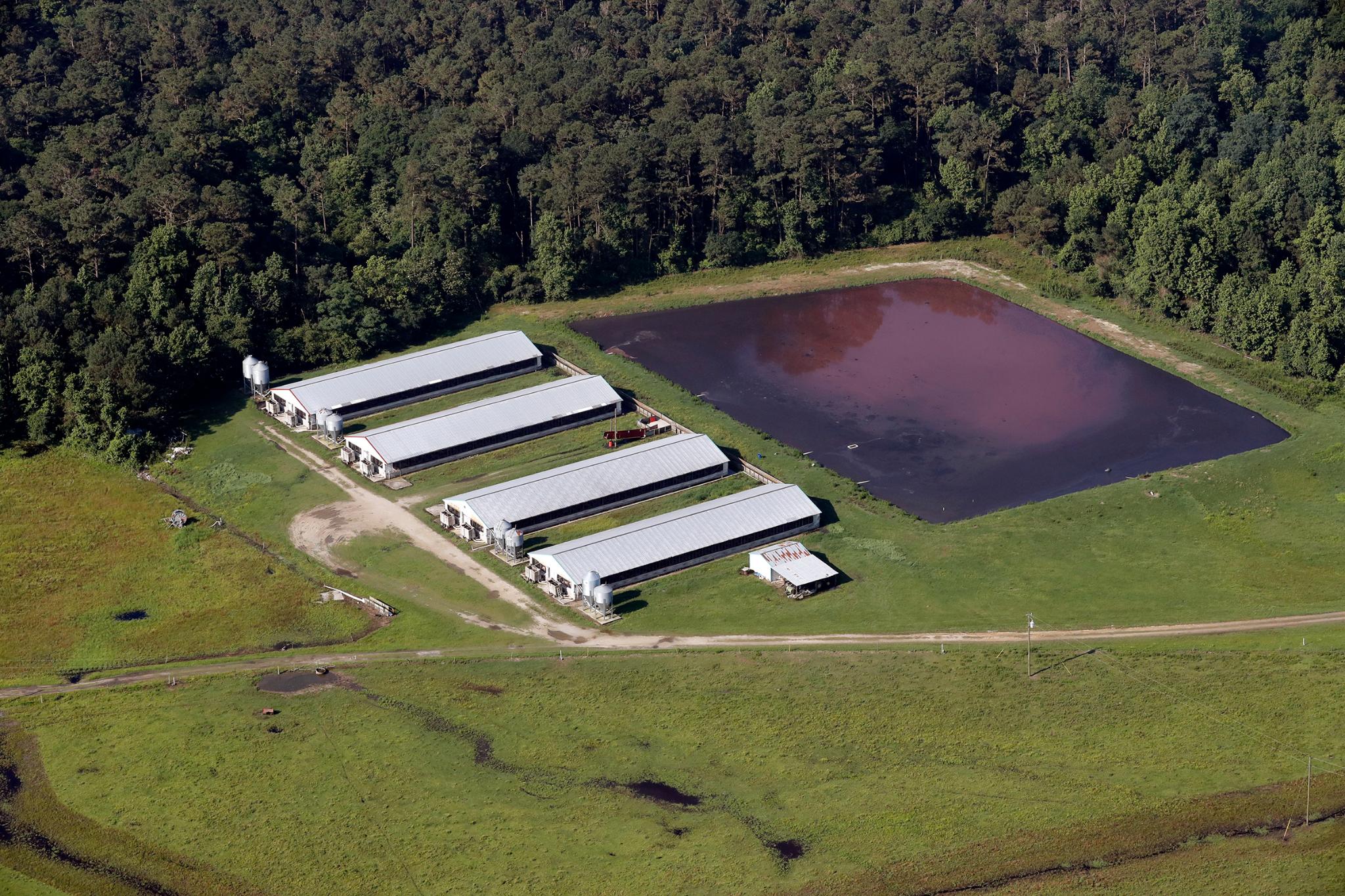What you need to know about the “Right to Farm Act”

Photo: Rick Dove, Waterkeeper Alliance
Oral arguments for the constitutional challenges to HB 467 and SB 711 (laws that eliminate nuisance claims) were held at the Court of Appeals (One West Morgan Street in Raleigh) at 2:00pm on Dec. 1.
Requests for change from all over North Carolina, including our coastal water quality community include:
Amendments to NC’s “Right to Farm” law (codified at N.C.G.S. §§ 106-701 & 702)
NC House Bill (HB) 467 (2017)
When a neighbor sues an agricultural or forestry operation for creating a private nuisance, the amount they can recover (their “damages”) is limited to their home’s lost property value. They can’t be compensated for other types of damages that have traditionally been awarded to plaintiffs for nuisance, including personal discomfort, inconvenience, annoyance, loss of enjoyment, injury to health, and mental distress.
The bill went even further by limiting the total, combined damages that can be recovered from an ag/forestry operation to the property’s fair market value. This means that no matter how many times an operation creates a nuisance or how severe the nuisance is, a neighbor can never be awarded more than their property’s fair market value. A couple of implications:
If the harmed property is eventually sold and the buyer sues the same ag/forestry operation for creating a nuisance, the buyer will not be compensated if the operator already paid fair market value to the seller in a previous lawsuit.
If a different company buys the ag/forestry operation and creates another nuisance, it will not be liable for damages if the first company already paid the full market value of the harmed property in a previous lawsuit.
Additionally, punitive damages can only be awarded to plaintiffs if there is “a criminal conviction or a civil enforcement action taken by a State or federal environmental regulatory agency pursuant to a notice of violation for the conduct alleged to be the source of the nuisance within the three years prior to the first act on which the nuisance action is based.”
Senate Bill (SB) 711 (2018)
SB 711 prohibits nuisance lawsuits against an ag/forestry operation unless: (1) the harmed property is located within a 1/2 mile of the ag/forestry operation and (2) the operation is less than a year old or undergoes a “fundamental change” which does not include a change in ownership, size, technology, or product. If an operation undergoes a “fundamental change,” any lawsuit must be brought within a year of that change.
The one-year time limit for filing a claim (the “statute of limitations”) begins when the operation is established or the fundamental change occurs, not when the nuisance starts. Under this one-year limit, essentially all CAFOs are protected from nuisance actions because no new hog operations were built after the 1997 moratorium on hog farms, and because of the very restrictive 2013 definition of “fundamental change”, essentially no operation that expands or changes operations can be sued for nuisance.
SB 711 also strikes N.C. Gen. Stat.§ 106-701(a2), which excluded “negligent or improper” agricultural or forestry operations from the law’s exemption from nuisance liability.
Three main arguments that HB 467 and SB 711 violate NC’s Constitution
Use and enjoyment of property is a fundamental right, and compensatory damages are a form of property. Because HB 467 and SB 711 concern a fundamental right, they must pass heightened scrutiny under the court’s “ends-means” test. Under this test, the State must look at the actual purpose of the law (in this case, to protect hog operations from nuisance liability and resolve pending lawsuits in Smithfield’s favor) and determine whether it was within the State’s proper police power. Additionally, the means chosen must be necessary and only reasonably interfere with property rights. SB 711’s elimination of the nuisance remedy for all hog operations in existence since 1997 and HB 467’s elimination of all compensatory damages except lost property value do not satisfy the “ends-means” test. In contrast, they exceed the state’s police power and unreasonably interfere with fundamental property rights.
HB 467 and SB 711 are “private” and “special” laws in violation of NC’s Constitution because they are designed to protect a specific industry from nuisance lawsuits with no reasonable justification. “Private” laws are “confined to particular individuals, associations or corporations”. “Special” laws deal with “individual cases” “for a special class or favored few”. In their pending lawsuits against Murphy-Brown/Smithfield, plaintiffs had already waived their right to recover lost property value. They were only seeking compensation for physical, emotional, and personal harms. The fact that HB 467 targeted the type of damages plaintiffs had already waived makes it very clear that the bill was designed to protect Smithfield from these lawsuits.
Legislators and the CEO of the NC Pork Council also made statements confirming that HB 467 was a response to the lawsuits. SB 711 was filed three weeks after plaintiffs were awarded $50.75 million in the first nuisance trial against Smithfield. It also contains a series of “whereas” clauses which make it obvious that the bill was filed in response to the verdict against Smithfield.
By removing the right to sue for traditional nuisance damages such as physical pain, annoyance, and stress, and the right of future homeowners to sue, HB 467 removes plaintiff’s right to a jury trial in property-related lawsuits.
Learn more about CAFOs and the Pure Farms, Pure Waters campaign.
